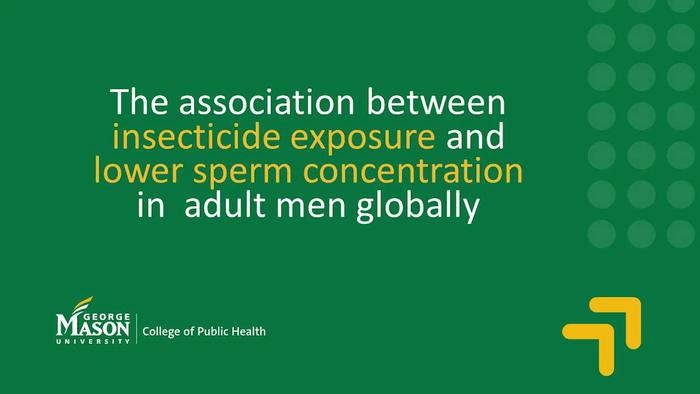EMBARGOED until November 15, 2023

Credit: George Mason University College of Public Health
EMBARGOED until November 15, 2023
Contact: Michelle Thompson
George Mason University
703-993-3485
New study finds association between insecticide exposure and lower sperm concentration in adult men
Comprehensive systematic review of 25 studies over nearly 50 years reveals consistent evidence of associations between insecticide exposure and lower sperm concentration
FAIRFAX, Va – Melissa J. Perry, Sc.D., MHS, dean of the George Mason University College of Public Health, and a team of researchers including Lauren Ellis, MPH, doctoral student at Northeastern University, found in a new systematic review that there is a strong association between insecticide exposure and lower sperm concentration in adult men globally.
“Understanding how insecticides affect sperm concentration in humans is critical given their ubiquity in the environment and documented reproductive hazards. Insecticides are a concern for public health and all men, who are exposed primarily through the consumption of contaminated food and water,” says Ellis.
The team reviewed nearly five decades of human evidence regarding the health impacts of exposure to two widely used insecticide classes, organophosphates and N-methyl carbamates, and found consistent associations with lower sperm concentration, which warrants concern, particularly in light of observed downward trends in semen quality demonstrated by other studies.
“This review is the most comprehensive review to date, sizing up more than 25 years of research on male fertility and reproductive health. The evidence available has reached a point that we must take regulatory action to reduce insecticide exposure,” says Dr. Perry, the senior author on the paper.
The research team systematically reviewed 25 human studies of occupational and environmental insecticide exposure conducted over the course of nearly 50 years. The study revealed consistent evidence of robust associations between insecticide exposure and lower sperm concentration.
“Adult Organophosphate and Carbamate Insecticide Exposure and Sperm Concentration: A Systematic Review and Meta-Analysis of the Epidemiological Evidence” will be published online in the peer-reviewed journal Environmental Health Perspectives on November 15. Once published, the paper will be available here. The full paper is available now under embargo. For a copy of the study or to speak with the authors, please email [email protected].
##
About College of Public Health at George Mason University
The College of Public Health at George Mason University is the first College of Public Health in Virginia combining public health transdisciplinary research, education, and practice in the Commonwealth as a national exemplar. The College enrolls more than 1,900 undergraduate and 1,300 graduate students in our nationally recognized programs, including six undergraduate degrees, eight master’s degrees, five doctoral degrees, and six professional certificate programs. The College is comprised of the School of Nursing and the Departments of Global and Community Health, Health Administration and Policy, Nutrition and Food Studies, and Social Work.
Journal
Environmental Health Perspectives
DOI
10.1289/EHP12678
Method of Research
Meta-analysis
Subject of Research
People
Article Title
Adult Organophosphate and Carbamate Insecticide Exposure and Sperm Concentration: A Systematic Review and Meta-Analysis of the Epidemiological Evidence
Article Publication Date
15-Nov-2023




